Al Jubail, located in the Eastern Province of Saudi Arabia, is one of the Kingdom’s fastest-growing industrial and urban hubs. With major petrochemical plants, infrastructure expansions, housing projects, and commercial developments thriving in the region, the demand for trustworthy, professional construction and contracting services has never been higher. However, selecting a reliable contractor in this dynamic environment can be a significant challenge.
At STS GCC, we understand the stakes. As a contractor with deep local experience in Al Jubail’s industrial, infrastructure, and utilities sectors, we know what sets a dependable contractor apart. This guide will walk you through the key steps to evaluate and choose the right contractor for your project — from credentials to experience, communication, safety, and local regulatory compliance — so that you avoid costly mistakes and ensure your project is delivered on time, on scope, and on budget.
Understand the Local Landscape in Al Jubail
Before you begin the contractor selection process, it’s crucial to develop a clear picture of how the construction and contracting sector operates in Al Jubail.
- Industrial Focus: Al Jubail’s economy is heavily centered on petrochemicals, oil & gas, power utilities, desalination and large-scale infrastructure. Any contractor working here must be experienced with industrial site environments, heavy equipment, piping, mechanical/structural works, and rigorous safety and HSE standards.
- Regulatory Framework: Contractors in Saudi Arabia must comply with the Saudi Contractors Authority (SCA) licensing, local municipal regulations, and industrial zone standards. The SCA plays a key role in rating contractors and ensuring qualified firms engage in the correct scope of work.
- Competitive Market: According to recent data, there are over 100 contractors in Al Jubail alone. With many small, single-owner operations, it becomes even more important to apply rigorous selection criteria.
- Weather & Site Conditions: Al Jubail has an arid climate, coastal influences and industrial zone logistics. Contractors must manage heat-stress, dust, corrosion, heavy equipment access and coordination with industrial clients.
By understanding this local context, you’ll be better equipped to evaluate potential contractors against relevant industry standards and local requirements.
Define Your Project Requirements Clearly
A common issue in contractor selection is starting the process without a clear specification of your project. At STS GCC we recommend the following steps:
- Scope of Work: Define whether the project is civil/infrastructure, mechanical & piping, electrical & instrumentation, or a turnkey package. In Al Jubail industrial zones, scope clarity is vital because of the complex systems and interface work.
- Budget & Timeline: Establish your budget range, preferred timeline, milestones and hand-over dates. A reliable contractor should ask detailed questions and propose realistic schedules rather than generic promises.
- Quality & Safety Standards: Confirm required standards (like ISO 9001, ISO 45001, NFPA, API) and site safety protocols. A contractor’s past adherence to these standards is a strong indicator of reliability.
- Site Conditions & Access: For Al Jubail you should identify site location (industrial zone, urban area, remote infrastructure), logistical constraints, utilities availability, and environmental conditions.
- Special Requirements: For example: working around operational plants, shutdowns, working in explosion-proof areas, interfacing with clients like SABIC or Saudi Aramco, import-export challenges, manpower sourcing, welding certification etc.
By documenting this early, you can use it as a benchmark when reviewing contractor proposals and credentials.
Shortlist Potential Contractors – What to Look For
Once you have your project brief, you can begin assembling a shortlist of potential contractors. Here’s what reliable contractors will demonstrate:
Credentials & Licensing
- Verify that the contractor is registered with SCA, and that their classification covers the size and scope of your job.
- Check corporate licences, Saudi business registration, tax (Zakat/GOSI) compliance and industrial zone approvals.
- Ask for evidence of insurance, bonding, performance guarantees, and any subcontractor management systems.
Experience in Al Jubail / Eastern Province
- Has the contractor worked on similar projects in Al Jubail or nearby industrial zones?
- Can they provide case studies or project profiles showing real performance and delivery? For example, STS GCC has completed infrastructure, mechanical/piping and utility works in Al Jubail.
- Are they familiar with local challenges (logistics, safety, environment, permit process)?
Reputation & References
- Ask for client references — both industrial (oil/gas, utilities) and non-industrial.
- Visit online directories and check ratings (for example, local data show a significant number of contractors in Al Jubail with ratings available).
- Ask for third-party verification of claims: quality audits, safety records, delivery performance.
Financial Stability & Resources
- A reliable contractor will have appropriate financial backing, equipment fleet, manpower resources and supply-chain access.
- Ask for proof of equipment ownership/rental agreements, manpower credentials, and supply-chain reliability (especially in a region like Al Jubail where industrial projects demand high capability).
Safety Culture & Quality Management
- Examine the contractor’s safety record, accident statistics and HSE policy.
- Check if they hold ISO 45001, ISO 9001 certifications or equivalent, and if they have staff trained in HSE, QA/QC.
- For industrial zones: request proof of compliance with client-specific safety standards (for example for client plants).
Conduct Due Diligence and Site Visit
Having shortlisted you should carry out deeper due diligence:
- Site visit: Visit some of the contractor’s current or completed job sites in Al Jubail. Observe quality of work, safety practices, site management, cleanliness, documentation.
- Review project documentation: Ask to see previous project schedules, change-order logs, financial tracking, QA/QC reports, HSE incident logs.
- Meet key personnel: Meet project manager, HSE manager, site engineer and ask about their experience, turnover, staffing continuity.
- Ask about subcontractors: In Al Jubail projects many firms rely heavily on subcontractors. Ensure the primary contractor has full control of subcontractor management, screening, QA/QC.
- Check legal and contractual standing: Ensure the contractor has no outstanding legal claims, disputes or major change-order liabilities that would risk your project.
This level of diligence helps uncover hidden risks and ensures you engage a contractor who is ready for your project’s demands.
Evaluate Proposals & Compare Responsibly
When contractors submit proposals, don’t just look at the lowest cost—compare across multiple dimensions:
- Scope Compliance: Does the proposal match your defined scope of work, timeline, quality standards, deliverables?
- Schedule & Milestones: Are milestones realistic? Is there a clear Gantt chart or schedule with dependencies?
- Payment Terms: Balanced payment milestones aligned to delivery—not front-loaded or risky.
- Change Order & Risk Management: How does the contractor handle change orders, cost overruns, site delays? A reliable contractor will include contingency plans.
- Quality Plan: What QA/QC procedures will they use? Inspect the plan for materials testing, inspection, documentation.
- Safety Plan: Especially for Al Jubail industrial sites, ensure there is a full HSE plan, shutdown/turnaround coordination if required, and emergency response.
- Workforce & Equipment Plan: Does the contractor detail manpower, equipment, logistics, procurement strategy?
- Local Content & Saudization: In many KSA projects, local Saudi labor content (Nitaqat) is important. Confirm compliance.
- Insurance & Liabilities: Ensure the contractor holds the appropriate insurances—public liability, workers compensation, equipment.
By scoring each proposal against these factors you can make a well-informed decision rather than simply selecting based on cost.
Final Contractor Selection & Contract Negotiation
Once you’ve selected a contractor, focus on setting up a robust contract:
- Detailed Scope of Work (SOW): Clearly define deliverables, exclusions, interfaces, milestones, acceptance criteria, quality standards.
- Performance Metrics & KPIs: Define KPIs for schedule, budget, safety, quality, change-order management.
- Clauses for Delay, Liquidated Damages: In industrial zones like Al Jubail where downtime can be extremely expensive, include delay penalties and incentives for early completion.
- Change-Order Procedures: Define how changes are managed, priced, approved, documented.
- Quality & Test Plan: Incorporate QA/QC, inspection deliverables, third-party testing if necessary.
- HSE Requirements & Compliance: Ensure HSE obligations are clear, with reporting, incident investigation, shutdown coordination.
- Termination & Warranty: Define conditions for termination, warranty obligations, handover requirements.
- Retention & Payment Terms: Payment schedule should align with milestones, not front-loaded; retention clauses protect your interests.
STS GCC emphasises that clear contractual frameworks are a critical component of reliability. A contractor may have great credentials, but without a robust contract you remain exposed.
Monitoring, Reporting & Managing the Contract
Once work begins, selecting the contractor is only the start — effective monitoring is equally vital:
- Regular Progress Reports: Receive weekly/monthly reports covering schedule, budget, change-orders, quality metrics, safety incidents.
- On-site Joint Reviews: Conduct regular site walks with your project team and the contractor’s management — review milestones, workmanship, site conditions, safety compliance.
- Change-Order Controls: Maintain strict change-order logs, review cost impacts, approve before implementation.
- Quality Inspections: Ensure third-party inspections, material testing and document control is executed as per plan.
- Safety Metrics: Monitor lost-time incidents, near miss logs, compliance with HSE policy.
- Communication & Stakeholder Engagement: Especially in Al Jubail sites there are multiple stakeholders (industrial clients, plant operators, authority regulators). Ensure the contractor engages all stakeholders and updates you proactively.
- Risk Management: Have a risk register, review regularly. The contractor should raise issues early and propose mitigations — this is a sign of reliability.
At STS GCC we consider the ongoing relationship with our clients as a partnership. We believe contractors who provide transparent reporting, proactive communication and early risk-notification are the most reliable.
Red Flags and What to Avoid
While you’re evaluating contractors, certain warning signs should prompt deeper investigation or rejection:
- No local presence or experience in Al Jubail / Eastern Province industrial zone
- Lack of valid licenses, insurance or subcontractor control
- Overly low bid compared to others — may indicate corner-cutting or under-resourcing
- Vague schedule or milestones, no realistic timeline
- Poor safety record or no visible HSE documentation
- Unwillingness to visit site, no references, weak past project documentation
- High turnover of key personnel or subcontractors – could indicate instability
- No change-order or risk management process — may expose you to cost overruns
By being alert to these red flags, you avoid engaging contractors who may compromise your project quality, timeline or budget.
Why STS GCC Stands Out as a Reliable Choice in Al Jubail
At STS GCC we bring together the elements you should look for in a contractor: local Al Jubail expertise, industrial and infrastructure project experience, strong HSE/QA systems, and a commitment to partnership and transparency.
- Local Experience: Based in Al Jubail and familiar with the site-conditions, logistics, regulations and stakeholders in the region.
- Proven Track Record: Delivered mechanical, piping, civil and electrical services to industrial, utilities and infrastructure clients in the Eastern Province.
- Safety & Quality Culture: Strong emphasis on HSE, quality management and delivering on schedule.
- Client-Centric Approach: We act as your partner, not just a contractor, providing open communication, risk management, and accountability.
Selecting STS GCC means engaging a contractor who understands the local environment, has the systems in place to deliver reliably, and values your success as much as you do.
Final Checklist Before You Commit
Before signing a contract, run through this checklist:
- ✅ Scope of work aligned with your project brief
- ✅ Contractor license and classification verified (SCA, local)
- ✅ Relevant experience in Al Jubail or similar industrial setting
- ✅ Quality, HSE and project delivery references provided
- ✅ Financial stability, equipment and manpower access confirmed
- ✅ Detailed schedule, milestones and payment terms agreed
- ✅ Contract includes KPIs, delay penalties, warranty & retention
- ✅ Change-order and risk-management processes documented
- ✅ Reporting and communication protocols established
- ✅ Early mobilisation plan & site logistics considered
If all the above are satisfied, you are in a strong position to engage a contractor with confidence.
Conclusion
Finding a reliable contractor in Al Jubail, Saudi Arabia, requires diligence, local knowledge, clarity of your own project requirements, and a rigorous selection process. By defining your scope, assessing credentials, conducting audits and ensuring ongoing monitoring, you increase your chances of engaging a contractor who will deliver quality, on time and within budget.
At STS GCC, we’re committed to the kind of transparency, expertise and local insight that clients require in today’s industrial and infrastructure environment. Whether you’re planning new construction, upgrades, or specialist services in the Eastern Province, we invite you to reach out and discover how working with a trusted partner makes all the difference.
Ready to start your next project in Al Jubail? Contact STS GCC today and let us help you find not just a contractor — but a reliable partner.







